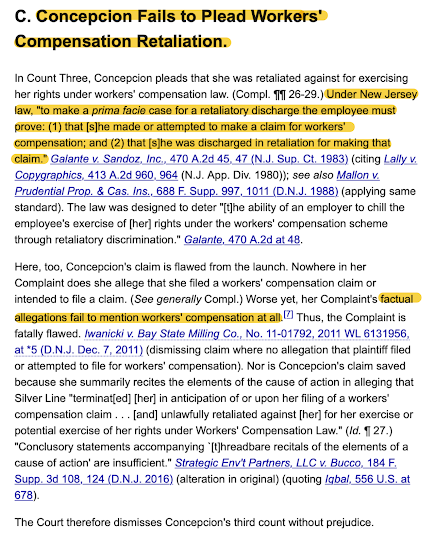FACTS
A 63-year-old female employee was physically assaulted by a male co-worker while waiting to push out of work. The injured worker was. She was employed for 20 years as a line worker in a window manufacturing factory; she had no negative performance reviews.
The assault occurred when the male worker, employed for three years with the company, grabbed her arm and called her a “fresh old woman.” The woman yelled, and he released her, and she suffered injuries to her neck, shoulder, and back, including multiple disc herniations. Complaints filed with Human Resources of the Copland resulted in the injured worker being discharged and terminated.
The injured worker filed an action in Federal Court alleging: 1. Age discrimination; 2. disability discrimination; and 3. workers’ compensation retaliation. The court dismissed all three counts without prejudice.
COMPLAINT DEFICIENT
Specifically focussing on the workers’ compensation discrimination cost, the court found the complaint fatally flawed. Two elements must be proven to adequately plead a. common law action for discharge for retaliatory discrimination flowing from a workers’ compensation claim. First, the employee must have made or attempted to claim benefits under the NJ Workers’ Compensation Act. Second, the employee was discharged for making a claim.
DISMISSED
The court held that neither of the above elements was alleged, and the complaint filed in Federal Court did not mention workers’ compensation law.
ANALYSIS
“A common law action for wrongful discrimination based upon an alleged retaliatory firing attributed to the filing of a workers' compensation claim is also available to an employee. N.J.S.A. 34:15-39.1 and 34:15-39.2 provide the basis upon which judicial remedies may be sought. The judicial remedies would include loss of wages and reinstatement of employment, as well as other compensatory and punitive damages.” Lally v. Copygraphics, 173 N.J.Super. 162, 413 A.2d 960 (App.Div.1980), aff'd 85 N.J. 668, 428 A.2d 1317 (1981). Gelman, Jon L, Workers’ Compensation Law, 38 NJPRAC 32.1 (Thomson-Reuters 2022).
CONCEPCION v. SILVER LINE BUILDING PRODUCTS, Civil Action No. 21-17920 (MAS)(TJB) (D.N.Y. May 31, 2022). NOT FOR PUBLICATION
No unpublished opinion shall be cited to any court by counsel unless the court and all other parties are served with a copy of the opinion and of all contrary unpublished opinions known to counsel. NJ Rule 1-36
By Jon L. Gelman
Courtesy of Workers' Compensation





